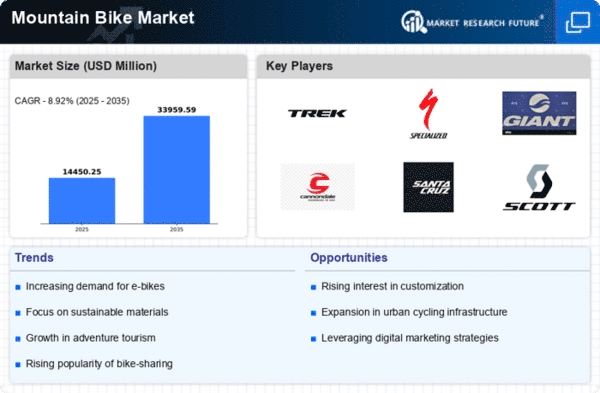Top Industry Leaders in the Mountain Bike Market
*Disclaimer: List of key companies in no particular order
The mountain bike market is a vibrant and dynamic space, driven by passionate riders, technological advancements, and the growing popularity of outdoor activities. Key players compete fiercely for market share, employing various strategies to cater to the diverse needs and preferences of mountain bikers.
Top Companies in the Mountain Bike industry includes,
Accell Group
Giant Manufacturing Co. Ltd
Pivot Cycles
Scott Sports SA
Trinx Bikes
XDS Bikes
Trek Bicycle Corporation
Diamondback Bicycles
Shimano Inc.
BH Bikes
Dorel Sports, and others.
Key Player Strategies:
Traditional Bike Giants: Established brands like Trek, Specialized, and Giant leverage their extensive experience, brand recognition, and global distribution networks to maintain their dominance. They focus on offering a wide range of bikes across different categories (downhill, cross-country, enduro, etc.) and price points, catering to riders of all skill levels and budgets.
Direct-to-Consumer Brands: Companies like Canyon, YT Industries, and Commencal are disrupting the market with online-only sales models, offering high-performance bikes at competitive prices. They prioritize cutting out middlemen costs and focus on building strong relationships with customers through online communities and forums.
Boutique Brands: Smaller, niche brands like Yeti, Santa Cruz, and Evil cater to specific segments of the market with high-end, handcrafted bikes. They emphasize innovative design, premium materials, and personalized customer service, attracting experienced riders seeking performance and exclusivity.
E-Bike Specialists: Companies like Specialized Turbo Levo, Trek Rail, and Giant Trance E+ are capitalizing on the surging popularity of e-mountain bikes (e-MTBs). They offer a range of e-MTBs for different riding styles and budgets, catering to both recreational riders and performance enthusiasts.
Factors for Market Share Analysis:
Product Portfolio Breadth: Offering a diverse range of bikes across categories, price points, and disciplines (e.g., downhill, cross-country, enduro) caters to a wider customer base and boosts market share.
Technological Innovation: Investing in R&D for new materials, suspension designs, and drivetrain technologies is crucial for staying ahead of the curve and attracting tech-savvy riders.
Brand Reputation and Marketing: Building a strong brand reputation for quality, performance, and community engagement is essential for attracting and retaining customers. Companies with effective marketing strategies stand out.
Direct-to-Consumer vs. Traditional Retail: Balancing the potential cost savings and control of online sales with the reach and customer service benefits of traditional bike shops requires careful consideration.
New and Emerging Trends:
E-MTB Boom: The e-MTB market is experiencing explosive growth, driven by advancements in battery technology and motor performance. Companies offering innovative and user-friendly e-MTBs stand to gain significant market share.
Focus on Sustainability: Using sustainable materials, implementing eco-friendly manufacturing practices, and promoting responsible end-of-life bike disposal are gaining traction. Companies demonstrating environmental consciousness attract eco-conscious riders.
Data-Driven Design and Personalization: Utilizing rider data and biomechanical analysis to create custom-designed bikes and suspension setups is an emerging trend, catering to riders seeking optimal performance and comfort.
Direct-to-Consumer Growth: The online sales model is expected to continue gaining traction, offering more choices and potentially lower prices for mountain bike buyers.
Overall Competitive Scenario:
The mountain bike market is a dynamic and competitive space with diverse players employing varied strategies. Traditional bike giants leverage their experience and reach, while direct-to-consumer brands disrupt with online sales and competitive pricing. Boutique brands cater to niche segments with high-end bikes, and e-bike specialists capitalize on the e-MTB boom. Product portfolio breadth, technological innovation, brand reputation, and marketing play crucial roles in market share analysis. New trends like the e-MTB boom, sustainability focus, data-driven design, and direct-to-consumer growth offer exciting opportunities for players to capture market share. To succeed in this competitive landscape, companies must adapt to evolving trends, cater to diverse rider needs, embrace innovation, and prioritize sustainability.
Industry Developments and Latest Updates:
Accell Group:
- October 26, 2023: Accell Group announces strong Q3 results, driven by continued demand for e-bikes. (Source: Accell Group press release)
Giant Manufacturing Co. Ltd:
- December 19, 2023: Giant announces partnership with World Wildlife Fund to protect endangered forests. (Source: Giant website)
Pivot Cycles:
- September 20, 2023: Pivot launches updated Phoenix downhill bike with improved geometry and kinematics. (Source: Pivot Cycles website)
- December 5, 2023: Pivot announces sponsorship of new downhill racing team, Pivot Factory Racing. (Source: Pivot Cycles website)
Scott Sports SA:
- December 15, 2023: Scott extends partnership with Nino Schurter, Olympic gold medalist mountain biker. (Source: Scott Sports website)
Trek Bicycle Corporation:
- September 7, 2023: Trek unveils all-new Fuel EX full-suspension bike with updated IsoStrut design. (Source: Trek Bicycle Corporation website)
Diamondback Bicycles:
- June 1, 2023: Diamondback launches Catch mountain bike series with focus on affordability and performance. (Source: Diamondback Bicycles website)










